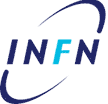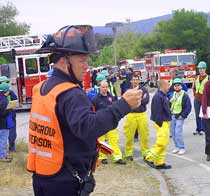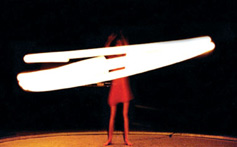 Sharing Ideas
and KnowledgeOne of the aspects of life at SLAC that I enjoy the most is the opportunity to learn from people with an enormously diverse range of skills, expertise and knowledge. On any one day, I can be educated on topics as diverse as material or vacuum technology, business management, multi-universe theory, crisis management, the challenges of modern scientific or business computing, laser accelerator possibilities, manufacturing, environmental and safety management, protein crystallography to name but a few. Some of the nation’s experts in such areas are just an on-site phone call or a short walk away. Add to this the number of nationalities and cultures that are represented at SLAC and one realizes that we enjoy the privilege of a workplace embodied by a highly rich mix of influences that offers unparalleled opportunities for gaining knowledge and sharing ideas. I hope you enjoy this aspect of SLAC as much as I do.
SLAC organizes two series of talks precisely to promote this kind of sharing of ideas and knowledge. The Colloquium series and the Public Lecture series offer two types of general lectures that allow attendees a chance to explore ideas outside their main field of interest. There is a colloquium this afternoon and a public lecture tomorrow evening.
Colloquium Series lectures, which have been running at SLAC for 30 years, take place on Mondays, and focus on subjects of general scientific interest. Many of the colloquia are in areas related to SLAC's mission—photon science, particle physics, astro-particle physics and cosmology, and accelerator physics. But there are frequently talks from a broader spectrum of disciplines within the physical and life sciences, the history of science, energy research, education and public policy. Thanks to the generosity of Pierre Schwob, colloquia are preceded by refreshments and snacks at 3:45 p.m. This is a perfect opportunity to meet new people and maybe make useful contacts. Many thanks to Pierre!
This afternoon's colloquium, Energy Policy and Energy Efficiency, speaks to one of the world’s great challenges. While he was at the Laboratory just this past Tuesday, Assistant Secretary for Nuclear Energy Dennis Spurgeon expressed to me just how important energy will be to the future of the nation. Understanding the central issues surrounding energy-producing technologies is crucial for establishing sound energy policy, not just within the United States, but globally. In today's colloquium, Professor Jim Sweeney of Stanford's Precourt Institute for Energy Efficiency will address these issues as he discusses how improvements in energy efficiency can be beneficial to California, the United States, and the world.
Less technical than colloquia, but equally relevant, are the talks in the SLAC Public Lecture Series. Open to the public and of course the SLAC staff, these lectures cover topics that are important to today's world---everything from making molecular movies to drug design. This Tuesday, David Grossman, who has worked for decades on the development of robots, will track the history of robots in Robots: Fantasy and Reality. A non-technical review of the history of these surprisingly animate machines from ancient Egypt to current times, Grossman's talk is sure to intrigue all who attend, so please bring your family and friends.
My thanks go to all those who organize these talks and who succeed in attracting such stimulating speakers. These fora provide an outstanding opportunity for us to expand our awareness and knowledge.
|
Changes to SLAC Telephone Dialing
by Brenda Eberle
 A special prefix code is used to access calling features on SLAC's telephone system. On the morning of Monday, April 30, the code will be changed from '6' to '636.' This change is necessary so that we can begin using a new block of telephone numbers obtained from AT&T to accommodate our growing number of telephone users. A special prefix code is used to access calling features on SLAC's telephone system. On the morning of Monday, April 30, the code will be changed from '6' to '636.' This change is necessary so that we can begin using a new block of telephone numbers obtained from AT&T to accommodate our growing number of telephone users.
All SLAC telephone Area Telecommunications Office Motivators (ATOMs) were
notified of this change at the beginning of March. Based on feedback we
have received, we expect the change to affect a very small percentage of
all SLAC telephone users. However, only you, the individual user, know
for certain if you use any of these features. Please keep reading to see
if this change affects you.
Read
more...
Summer Exchange Program with INFN
by Alison Drain
 Calling all third and fourth-year undergraduates! Or at least ones with backgrounds and interest in physics, engineering, or computing studies, and the desire to combine research and travel.
The Summer Exchange Program offers a unique opportunity for students to work directly with Italian scientists and absorb their country's rich culture. The deadline for applications is April 29, 2007. Calling all third and fourth-year undergraduates! Or at least ones with backgrounds and interest in physics, engineering, or computing studies, and the desire to combine research and travel.
The Summer Exchange Program offers a unique opportunity for students to work directly with Italian scientists and absorb their country's rich culture. The deadline for applications is April 29, 2007.
The exchange, sponsored by the U.S. Department of Energy
Office of Science and the
National Institute for Nuclear Physics of Italy (INFN), sends U.S. undergraduate students to Italy for eight to ten weeks to work with scientists on projects, while Italian students have similar opportunities stateside. Potential research areas include particle physics, astro-particle physics, nuclear physics, theoretical physics, and detector physics.
Information about the Italian program may be found
here. For additional information, contact
Harvey Lynch.
Photo:
Tunnel Rescue Drill
by Brad Plummer

Click on image for larger version. Tim Nigh of the Palo Alto Fire Department briefs participants in preparation for a rescue drill conducted at SLAC
late last week. Several local search and rescue teams, along with SLAC Emergency Response Team members, used mannequins to simulate an underground rescue in a utility shaft along PEP Ring Road.
Safety Firsts
by John Cornuelle
We have a certain type of injury at SLAC that in almost every case has occurred while the injured party was wearing what they thought was the appropriate
Personal Protective Equipment (PPE) for the task they were performing. Can you guess the answer and better yet the fundamental cause? (This is hard—you get an A+ if you
guess correctly. Hint: damage to the PPE was not the issue.)
South Gallery Road Closed Today
South Gallery Road will be closed from 7:00 a.m. until 12:00 p.m. today to
allow crews to drain oil from a transformer.
|
Lab Announcements
Community Bulletin Board
|






 <%
Response.AddHeader "Last-modified", getArticleDate()
'Response.AddHeader "Last-modified","Mon, 01 Sep 1997 01:03:33 GMT"
'Monday, December 06, 2010
%>
<%
Response.AddHeader "Last-modified", getArticleDate()
'Response.AddHeader "Last-modified","Mon, 01 Sep 1997 01:03:33 GMT"
'Monday, December 06, 2010
%>